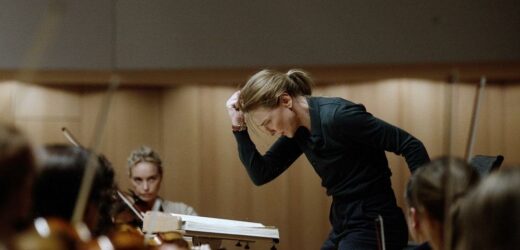There are a lot of enticing questions that haunt “Tár,” Todd Field’s rapturously fascinating, dread-fueled, immersive drama about a symphony orchestra conductor, Lydia Tár (Cate Blanchett), who is living an above-the-clouds existence of art and fame and sensuality…until she isn’t. The movie, which feels like a documentary directed by Kubrick, is a kind of reality-based hifalutin humanistic tabloid puzzle thriller, one that deliberately withholds pieces of information, a tactic some viewers have a problem with, though I think it’s integral to the movie’s mind-game greatness.
“Tár,” as driven by Cate Blanchett’s extraordinary performance, brings us right up close to Lydia: her passion on the podium, the hyper-articulate fury with which she discusses the intricacies of music and everything else, her spy-like maneuvers. At moments we’re practically in sync with her breathing. Yet aspects of her remain in the shadows — hidden from the world and, in a certain way, from herself. She’s a power player who knows just what she’s up to but not always what it means. (She’s a predator who doesn’t think of herself that way.) In “What She Said,” a documentary portrait of the film critic Pauline Kael, Kael’s daughter, Gina, spoke of her mother’s “lack of introspection, self-awareness, restraint, or hesitation” and the “supreme freedom” it gave her. Lydia Tár is like that too. And “Tár,” a movie that doesn’t just tell the story of its protagonist but watches her, studies her, mirrors her, is a movie that’s willing to keep a secret or two from the audience. That’s its way of tantalizing us to look closer.
I’ve seen “Tár” three times, and I’ll confess to one aspect of it that I’m still not totally clear about (I say confess because it’s supposed to be my damn job to figure this stuff out). And that’s what, exactly, went on between Lydia and Krista (Sylvia Flote), a twentysomething New Yorker who landed in Lydia’s Accordian fellowship for up-and-coming female conductors. If you don’t want a couple of the film’s key secrets revealed, it would be best to stop reading here.
We know this much: that Lydia carries on romantic-erotic flings with the awestruck young women in her orbit, and that she had an intense version of one of those liaisons with Krista. We know that the relationship didn’t end well, and that Krista was troubled and “unstable.” We know that Lydia, after the fling was over, sent a series of messages out to the orchestra executives in her circle warning them not to hire Krista. And we know that Krista is stalking her. We see Krista, though only from the back (silky red hair, formidable bearing), when she’s seated in the audience watching Lydia being interviewed onstage by Adam Gopnik of The New Yorker. We see Lydia, in the bathroom of an airplane, opening a package that Krista had delivered to her — it’s the vintage edition of a novel, “Challenge,” by Vita Sackville-West, that was the author’s roman à clef about her enraptured but guilt-ridden relationship with an admiring woman who threatened to commit suicide if she was abandoned.
In “Tár,” the backstory of what happened between Lydia and Krista is like a sleeping snake that comes to life. Lydia, in her highly controlled and compartmentalized way, starts to freak out about it, clearly wanting the whole story suppressed. But then it starts to boil over. The end of the affair slides from unhappy to tragic. Lydia begins to frantically erase all the messages she sent. But her assistant, Francesca (Noémie Merlant), who Lydia has also been romantically entangled with, has loyalties that may lie elsewhere (it feels like she was in love with Krista too). She isn’t so cooperative in covering it all up, especially once Lydia passes her over for an assistant conductor position. (“Tár” is, among other things, a drama of corporate backstabbing, and what you’d say about this particular executive decision of Lydia’s is: big mistake.)
Did Lydia end the relationship with Krista, who became all the more obsessed with her? I think that’s what happened, though the vehemence with which Lydia choked off Krista’s potential future as a conductor suggests other scenarios, as do several dream images of Lydia and Krista together, as though the allure of that bond were still haunting Lydia. Did Krista dump her, and Lydia exact her revenge? That would be a classic sexual-harassment template, and the possibility at least looms.
That I’m still pondering this situation as if the characters were real people says a lot about how “Tár” gets inside your system. That the answer may not, in the end, matter much says a lot about Field’s strategy of luring us in by keeping us a bit in the dark. “Tár,” while shot in elegant modern concert halls and posh restaurants and a Berlin apartment as grand as a museum, is a mysterioso film noir in which we divine the larger pattern of Lydia’s scurrilous behavior and watch it all catch up to her. Field, inspired I would say by Kubrick (who he worked with on “Eyes Wide Shut,” where he played the ivory-tickling mood-setter Nick Nightingale) and perhaps by Michael Haneke, adopts a God’s-eye view of what happens to Lydia, though that doesn’t mean our identification with her is lessened. If anything, it’s only heightened as fate tightens around her.
There’s a seductive tradition of that in pop culture: in Kubrick’s films (which lock us into communion with the destructive souls of characters like Alex in “A Clockwork Orange,” Barry in “Barry Lyndon,” or Jack Torrance in “The Shining”), in noirs like “Double Indemnity,” where we’re asked to identify with the sordid temptations of sex and murder, and in a series like “Mad Men,” which asks us to be the silent partners of Don Draper’s intricate duplicities. To echo what Flaubert said about Madame Bovary, watching “Tár” you feel: Lydia Tár, c’est moi.
And that’s what invests her downfall, which is swift and terrifying, with such hauntingly ambiguous meaning. Watching “Tár,” you’re likely to be spectacularly divided about what happens to Lydia. We experience it all through her eyes, and it’s the nature of that to feel pity and terror. It’s telling that the first missive in the campaign against her is a video, edited in a distorted way, of the master class we saw her teaching at Juilliard. It was a mesmerizing scene, where Lydia, with a visionary ferocity fueled by her annoyance at one of the students, defends the glory of dead-white-male composers (the fact that J.S. Bach sired 20 children is supposed to be a patriarchal strike against him) and argues against the ideology of identity politics that would bury them. Reactions to what Lydia says in this scene will depend on the individual (I agreed with most of it), but in the video that goes viral she’s made to seem like a racist and an anti-Semite (she was, in fact, referencing racism and anti-Semitism to denounce them), made to look like she was groping one of her students (she’d put a hand on a jiggling knee to calm it down), along with other manipulated micro-transgressions. In other words, her cancellation is launched with a false fanfare.
The second domino to fall is an article about Lydia’s flings with Accordian fellows that appears in The New York Post — a legitimate topic, but the Post has a history of taking sensational stories and bending them into even more sensational shapes, so we wonder if there’s distortion there as well. By the time that Lydia, on a publicity tour for her book “Tár on Tár,” makes an appearance with the comely Russian cellist (Sophie Kauer) she has been grooming, and protesters appear, the ground is being knocked out from under her. The sheer momentum of it makes you suck in your breath. It’s all about judgment, yet there is scarcely time for judgment — there is only the endless present-tense moment of a digital piling on.
And yet… we know that Lydia is guilty. She has had affairs with the women who work under her, and has exploited her power to make (or break) careers as a way to barter them. She uses these women and tosses them aside. The details remain murky, but she’s a predator. So is it therefore righteous that she gets taken down? To suggest otherwise might be to sound like one is enabling unacceptable behavior. Yet Lydia, tellingly, is so suffused with rage that she deals the coup de grâce to herself, in a scene that’s as memorably outrageous a movie moment as Bradley Cooper’s Grammy Awards meltdown in the 2018 “A Star Is Born.”
In “Tár,” Lydia Tár makes her own bed, but she also gets tarred. It’s telling that she has been rehearsing the Berlin Philharmonic in the first movement of Mahler’s Symphony No. 5, because that movement, with its grand stoic echo of the motif of Beethoven’s Fifth, is called Trauermarsch, or funeral march; Lydia, we realize, has spent the entire film digging her own grave. Yet when she arrives in Thailand, where she has managed to scrape together a post-cancellation gig, the movie concludes with a diminuendo that has the kick of a mule. The scene set in a massage parlor is brilliant. Lydia literally thinks that she’s going there for a massage, but when she’s confronted with all the girls in a room, arranged and numbered, and she and one of the girls lock eyes, she sees, for the first time, who she really is. She glimpses the true nature of all the affairs she has had.
And when she’s finally conducting, Todd Field takes the movie away from her and gives us his ultimate statement about the “new world” we’ve landed in: the world of instant moral judgement, of trial by social media, that has cancelled Lydia. The people in the audience are wearing costumes and, in some cases, masks; they look like they’re in a cult. What is Field saying about Lydia’s downfall? That he approves or disapproves? That she deserved it or not? His answer is: The movie has shown it to us. You decide.
Read More About:
Source: Read Full Article


